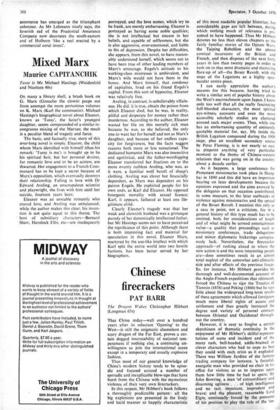Mixed Marx
Maurice CAPITANCHIK
Tussy is Me Michael Hastings (Weidenfeld and Nicolson 40s) On many a library shelf, a brash book on G. Marx (Groucho the clown) peeps out from amongst the more portentous volumes on K. Marx (Karl the communist). Michael Hastings's biographical novel about Eleanor, known as Tussy', the latter's youngest daughter, seems compounded of a similar in- congruous mixing of the Marxes; the result is a peculiar Wend of tragedy and farce.
The basic, and factually true, story of this over-long novel is simple. Eleanor, the child whom Marx identified with himself (thus his remark: 'Fussy is me') is brought up to be his spiritual heir, but her personal desires, for romantic love and to be an actress, are thwarted. Her engagement to a French Com- munard has to be kept a secret because of Marx's opposition, which eventually destroys their relationship. Falling in love with Dr Edward Aveling, an unscrupulous scientist and playwright, she lives with him until her suicide, fourteen years later.
Eleanor was an unstable romantic who craved love, and Aveling was unbalanced; while the author makes this clear, his inven- tion is not quite equal to this theme. The host of subsidiary characters—Bernard Shaw, Havelock Ellis, etc—are inadequately
portrayed, and the love scenes, which try to be frank, are merely embarrassing. Eleanor is portrayed as having some noble qualities; she is not intellectual but sincere in her beliefs, and capable of selflessness, but she is also aggressive, over-emotional, and liable to fits of depression. Despite her difficulties, she appears, from this novel, to have reason- ably understood herself, which seems not to have been true of other leading members of Marx's entourage. Engels's attitude to his working-class mistresses is ambivalent, and Marx's wife would not have them in the house. And Marx himself, that condoner of capitalists, lived on- his friend Engels's capital. From this sort of hypocrisy, Eleanor was relatively free.
Aveling, in contrast, is unbelievably villain- ous. He did, it is true, obtain the poison from which Eleanor died, but he was, in reality, pitiful and desperate for money rather than murderous. According to the author, Eleanor wasted her life on this morally sick man because he was, so she believed, the only one to want her for herself and not as Marx's daughter, and because of her endless capa- city for forgiveness, but the facts suggest reasons both more or less sensational. The dedicated humanist Marx was also insensitive and egotistical, and the father-worshipping Eleanor transferred her fixations on to the more overtly ruthless Aveling, who was, as it were, a familiar wolf bereft of sheep's clothing. Aveling was clever but financially dependent, as Marx was dependent on his patron Engels. He exploited people for his own ends, as Karl did Eleanor. He opposed bourgeois morality with sexual licence; Karl, it appears, fathered at least one ille- gitimate child.
Clearly Eleanor's tragedy was that her weak and clownish husband was a grotesque parody of her demonically intellectual father, but Mr Hastings seems not to have perceived the significance of this point. Although there is both interesting fact and material for speculation in this novel, Eleanor Marx, martyred by the axe-like intellect with which Karl split the entire world into two hostile factions, has been better served by her biographers.






































 Previous page
Previous page